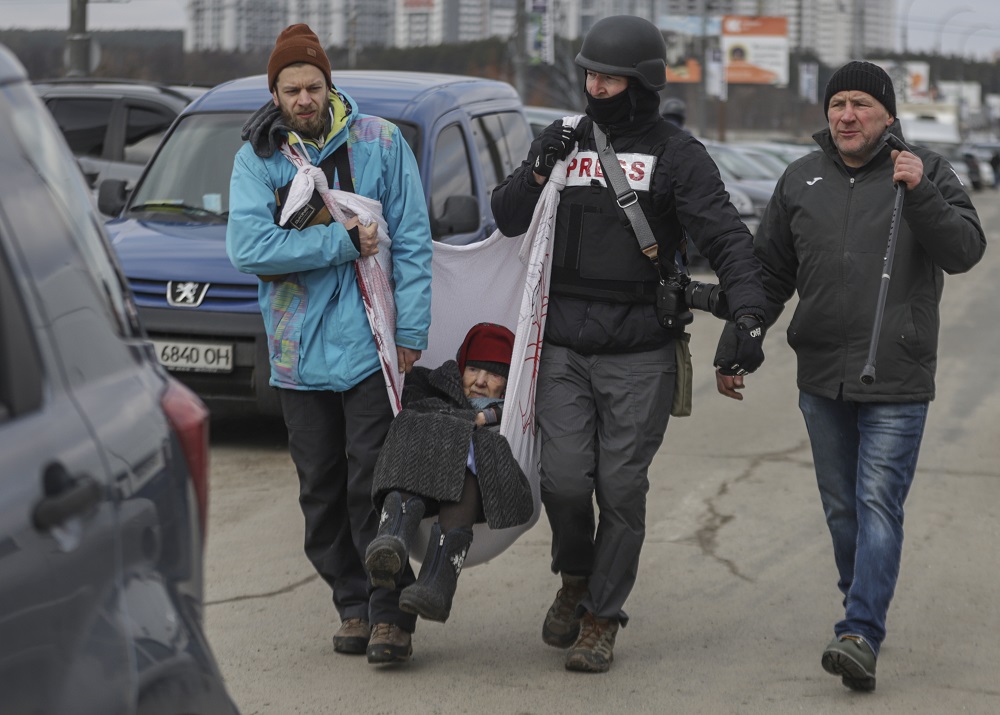Each conflict has new challenges and lessons for the media, so what does Russia’s war in Ukraine teach us? Panelists from Georgia, Ukraine, and the U.S. speaking at the 2022 IPI World Congress gave three different points of view on covering Russia’s war in Ukraine: one as a Ukrainian journalist covering the war in her home country; one as a foreign correspondent coming in from the outside; and one as an editor covering the war from a distance. The conversation was moderated by David Jordan, director of editorial policy and standards at the BBC.
During times of war, the media must remember the main job of independent journalism, namely, being skeptical, the three speakers agreed.
For the editor-in-chief of the Ukrainska Pravda, Sevgil Musaieva, as a Ukrainian journalist the challenge of the war has been balancing between being a citizen and being a journalist. The first weeks of the war were challenging for Musaieva and her team: you have to think about your relatives and friends on the frontline of the war while also thinking about producing critical journalistic content, she said.
“At the same time we’re exhausted, traumatized but also hopeful”, Musaieva said, summarizing the feelings of her team.
⚡️ #IPIWoCo Starting now: ‘When it’s war’.
Covering war lies deep in journalism’s roots. But each conflict brings new challenges & lessons. In this session, @BBCDavidJordan, @antelava @SMusaieva & @SuzanneMalveaux analyze what Russia’s war in Ukraine teaches us. pic.twitter.com/qlI10ls7pO
— IPI – The Global Network for Independent Media (@globalfreemedia) September 9, 2022
Natalia Antelava, editor-in-chief of Coda Story in Georgia, has covered the Russian invasion of Georgia in 2008, the war in eastern Ukraine, and reported undercover from Burma, Yemen, and Uzbekistan. She noted that the Russian invasion in February was an escalation of an already existing conflict.
“The scale of the invasion in February was shocking but the war itself was not new, it had been going on for eight years already”, Antelava said.
She spoke about having to make the difficult decision to not send any journalists from her team to Ukraine when the invasion began due to resource and security issues. Instead, she wanted to focus on the bigger picture around the war, focusing on the root causes of the crisis and the patterns shaping the conflict.
The experience of working during the invasion was different for Suzanne Malveaux, a national correspondent for CNN who covered the Russian invasion on the ground in Lviv.
“It’s a blessing and a curse to be part of a huge organization but the good thing is that resources are incredible”, Malveaux said.
One of the challenges she faced was how social media has changed the way people experience war and how journalists report in real time. During her time in Ukraine, she was able to get in contact with a woman whose husband was inside the Mariupol steel plant. The couple communicated through social media, and Malveaux was able to get almost real-time updates from the steel plant. Eventually, the husband had to tell his wife that they were surrendering to the Russians and communications would likely be cut.
“It’s amazing compared to previous crises how we can have real time experiences through social media. At the same time, we also have to be cautious around ethical questions about suffering and that the situations are not staged”, Malveaux told the Congress.
Russia’s war in Ukraine is different from many other conflicts in the sense that the situation is very black and white”, Antelava, of Coda Story, suggested. However, she said this shouldn’t get in the way of journalism being critical of Ukraine, too, the panelists agreed.
“It is important for the Western media not to do what it has done in the past. It’s important not to put anyone on a pedestal. No one is perfect, we all need to remember that. We need to do our job”, stated Antelava, with panelists highlighting the example of Ukraine’s president, Volodymyr Zelenskyy, who has been feted as a national hero by the western media.
“We fight for democracy, for principles”, Musaieva, of Ukrayinska Pravda, emphasized..
Antelava also said that in previous conflicts the media had not always been successful in explaining the global impact of wars.
“We have to jump on the opportunity of being able to explain how things happening in Ukraine affect the rest of the world”, Antelava said.
